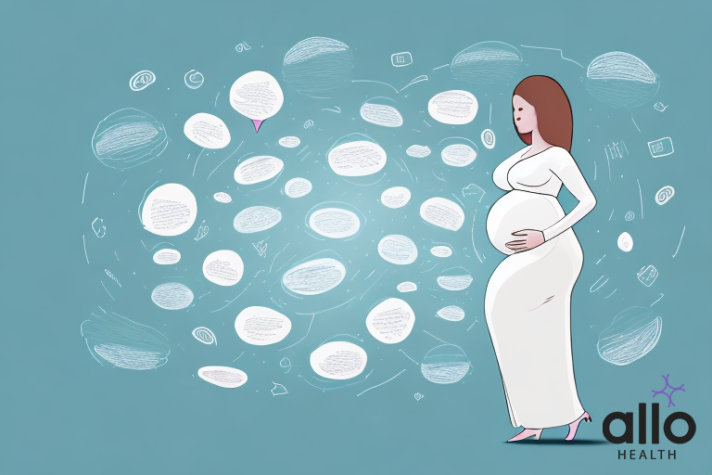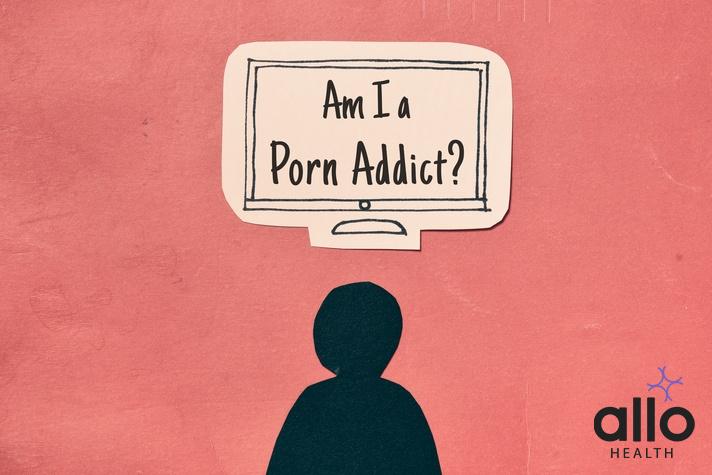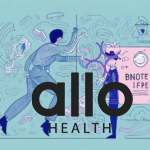How to Overcome Porn Addiction When You’re Pregnant

Allo Health is dedicated to personalized well-being, offering support and trusted information tailored to individual health goals. The platform emphasizes human-generated content, led by a distinguished medical team of experts, including physicians and sexual health specialists. Their commitment to credibility involves rigorous fact-checking, authoritative research, and continuous updates to ensure accurate, up-to-date information. Allo Health's unique approach goes beyond conventional platforms, providing expert-led insights and a continuous commitment to excellence, with user feedback playing a crucial role in shaping the platform's authoritative voice.

Dr.Sushma.V completed MBBS degree from BGS GIMS,bangalore
Why This Was Upated?
Our experts continually monitor the health and wellness space, and we update our articles when new information became available.
Updated on 16 March, 2024
- Article was updated as part of our commitment to diversity, equity, and inclusion.

"The following blog article provides general information and insights on various topics. However, it is important to note that the information presented is not intended as professional advice in any specific field or area. The content of this blog is for general educational and informational purposes only.
Book consultation
The content should not be interpreted as endorsement, recommendation, or guarantee of any product, service, or information mentioned. Readers are solely responsible for the decisions and actions they take based on the information provided in this blog. It is essential to exercise individual judgment, critical thinking, and personal responsibility when applying or implementing any information or suggestions discussed in the blog."
Pregnancy is a time of significant change for women, both physically and emotionally. It’s not uncommon for women to experience increased stress, anxiety and other mental health issues during this period. For some women, these challenges are amplified by porn addiction. Porn addiction during pregnancy can have serious consequences – both for the mother and the baby. In this article, we’ll explore the risks of porn addiction during pregnancy and offer actionable tips on how to overcome it.
What Is Porn Addiction?
Porn addiction, also known as compulsive sexual behavior disorder or problematic sexual behavior, is a controversial and debated concept within the field of mental health. It is not officially recognized as a separate disorder in widely accepted diagnostic manuals such as the Diagnostic and Statistical Manual of Mental Disorders (DSM-5) or the International Classification of Diseases (ICD-10). However, some mental health professionals and researchers acknowledge the existence of problematic patterns of sexual behavior that can be distressing and impairing.
Here are some key points related to the concept of porn addiction:
- Lack of Official Recognition: As mentioned, porn addiction is not officially recognized by major diagnostic manuals. The debate stems from the lack of consensus among experts regarding whether excessive porn consumption can be classified as an addiction in the same way as substance abuse.
- Controversial Nature: The term “porn addiction” is often criticized for being imprecise and stigmatizing. Critics argue that it pathologizes a range of behaviors that might be better understood as symptoms of other mental health issues, relationship problems, or societal factors.
- Behavioral Addiction: Those who argue for the existence of porn addiction often liken it to behavioral addictions, similar to gambling addiction or internet addiction. The addictive nature is said to be driven by the repetitive engagement in a rewarding behavior (in this case, viewing porn) despite negative consequences.
- Compulsive Patterns: People who identify as struggling with porn addiction may exhibit compulsive patterns of consumption, spending an excessive amount of time on pornographic material to the detriment of their personal, professional, or social life. They may find it difficult to control their urges to engage in this behavior.
- Impact on Relationships: Excessive consumption of pornography may lead to problems in relationships, as it can affect sexual intimacy, communication and emotional connection. Partners of individuals engaging in problematic sexual behavior may experience feelings of betrayal, insecurity and frustration.
- Psychological and Emotional Impact: Some individuals who perceive themselves as having a problem with porn consumption report negative psychological and emotional effects, such as guilt, shame, anxiety, and depression. However, it is essential to note that these effects can vary widely among individuals.
It’s crucial to approach the topic with sensitivity and recognize that people’s experiences with pornography use can be diverse. Seeking professional help from mental health experts, such as therapists or counselors, is recommended for those who feel distressed by their sexual behaviors, regardless of whether the term “porn addiction” is applied. Treatment approaches may involve cognitive-behavioral therapy, mindfulness, and addressing underlying psychological issues or relationship dynamics.

Porn Addiction When You’re Pregnant: Causes & Symptoms
The concept of “porn addiction” during pregnancy is a complex and sensitive topic. While the term itself is not officially recognized in widely accepted diagnostic manuals, some individuals may express concerns about the impact of excessive pornography consumption during pregnancy. It’s important to approach this issue with sensitivity, recognizing that experiences and concerns can vary widely among individuals. Here are some aspects to consider:
- Limited Research: There is limited empirical research specifically addressing the impact of porn addiction during pregnancy. Most studies on pornography addiction have focused on general populations and research specific to pregnant individuals is scarce.
- Potential Causes:
- Coping Mechanism: Some individuals may turn to pornography as a coping mechanism for stress, anxiety, or other emotional challenges. Pregnancy can be a time of significant physical and emotional changes, which may contribute to increased stress levels.
- Escapism: Pornography may serve as a form of escapism from the challenges and uncertainties associated with pregnancy. Individuals may use it as a way to distract themselves from the physical discomforts or emotional concerns related to the pregnancy.
- Symptoms and Concerns:
- Neglecting Responsibilities: Excessive engagement with pornography, to the point of neglecting responsibilities, may be a symptom of problematic behavior. This could include neglecting household tasks, work responsibilities, or the needs of a partner.
- Impact on Relationship: If a partner is concerned about the amount of time spent on pornography, it may lead to relationship strain. Open communication about concerns and feelings is crucial for addressing potential relationship issues.
- Communication and Support:
- Open Dialogue: Maintaining open communication between partners is essential during pregnancy. Discussing concerns, expectations and feelings about pornography or any other potential issues can help foster understanding and support.
- Seeking Professional Help: If concerns persist or if the individual feels distressed by their behavior, seeking the guidance of a mental health professional, such as a therapist or counselor, can be beneficial. Professional support can help address underlying issues, improve coping strategies, and enhance relationship dynamics.
- Self-Care and Coping Mechanisms:
- Healthy Coping Strategies: Encouraging healthy coping mechanisms, such as mindfulness, exercise and relaxation techniques, can provide alternative ways to manage stress during pregnancy.
- Support Networks: Building a support network of friends, family, or support groups for pregnant individuals and couples can offer emotional support and practical assistance.
It’s crucial to approach concerns related to pornography use during pregnancy with empathy and understanding. Every individual’s experience is unique, and seeking professional guidance, if needed, can be valuable in addressing any challenges that arise. Additionally, maintaining a supportive and communicative relationship between partners can contribute to a healthy and positive pregnancy experience.
Porn Addiction When You’re Pregnant: Treatment
Addressing concerns related to porn addiction during pregnancy involves a comprehensive and individualized approach. It’s important to note that while the term “porn addiction” is not officially recognized in major diagnostic manuals, the distress and challenges associated with excessive pornography consumption can be addressed through various therapeutic strategies. Here is a detailed overview of potential treatment approaches:
- Individual Therapy:
- Cognitive-Behavioral Therapy (CBT): CBT is a commonly used therapeutic approach that can help individuals identify and change negative thought patterns and behaviors. It can be effective in addressing the underlying causes of excessive pornography consumption, such as stress, anxiety, or coping mechanisms.
- Mindfulness-Based Therapy: Mindfulness techniques, including meditation and mindfulness-based cognitive therapy, can help individuals become more aware of their thoughts and feelings. These techniques may assist in developing healthier coping mechanisms and reducing reliance on pornography.
- Couples Counseling:
- Communication Skills: Couples counseling can provide a safe space for partners to openly discuss concerns and feelings related to pornography use. Improving communication skills can be beneficial in addressing relationship dynamics and fostering understanding.
- Relationship Building: Counseling sessions can focus on strengthening the emotional connection between partners. Developing intimacy, trust, and mutual support can contribute to a healthier relationship during pregnancy.
- Sex Education and Counseling:
- Sexual Health Education: Incorporating sexual health education into counseling sessions can help individuals and couples understand the potential impact of excessive pornography consumption on their sexual relationship. This education can promote a more informed and balanced perspective on sexuality.
- Intimacy Building: Counselors may work with individuals and couples to explore and enhance intimacy through various exercises and discussions. This can help create a more fulfilling and connected sexual relationship.
- Support Groups:
- Addiction Support Groups: Joining support groups specifically focused on addressing addictive behaviors, including those related to pornography, can provide a sense of community and shared experiences. These groups often offer mutual support and encouragement.
- Pregnancy Support Groups: Connecting with support groups for pregnant individuals or couples can provide additional emotional support during this significant life transition.
- Healthy Coping Strategies:
- Stress Management Techniques: Encouraging the development of healthy stress management techniques, such as exercise, deep breathing, or relaxation exercises, can provide alternative ways to cope with the challenges of pregnancy.
- Self-Care Practices: Promoting self-care practices, such as adequate rest, proper nutrition, and engaging in activities that bring joy, can contribute to overall well-being.
- Professional Consultation:
- Medical Evaluation: If concerns about pornography use are accompanied by signs of distress, anxiety, or depression, a medical evaluation may be recommended to rule out any underlying physical or mental health issues.
- Psychiatric Consultation: In some cases, a psychiatric consultation may be beneficial to assess whether medication may be helpful in managing underlying mental health conditions contributing to excessive pornography consumption.
It’s essential for individuals and couples to work collaboratively with mental health professionals to tailor a treatment plan that addresses their unique needs and concerns. Seeking support early and maintaining open communication are key components of addressing challenges related to pornography use during pregnancy.
Most Asked Questions
-
Is it common for pregnant individuals to experience concerns about pornography consumption?
Yes, it's not uncommon for individuals, pregnant or not, to have concerns about pornography consumption. Pregnancy can bring about various emotions and stressors, leading some to reassess their habits and seek support for any challenges they may be facing.
-
Can excessive porn consumption during pregnancy impact the developing fetus?
There's no direct evidence that excessive porn consumption during pregnancy directly affects the developing fetus. However, maintaining a healthy lifestyle, both physically and emotionally, is essential for the well-being of both the pregnant individual and the baby.
-
Is it possible for a pregnant person to seek treatment for concerns related to porn addiction?
Absolutely. Pregnant individuals can seek treatment for concerns related to porn consumption. Therapeutic approaches, such as cognitive-behavioral therapy and couples counseling, can provide valuable support in addressing underlying issues and improving overall well-being.
-
How can partners navigate conversations about pornography concerns during pregnancy?
Open communication is key. Partners should approach discussions with empathy, expressing concerns without judgment. Couples counseling can provide a safe space to explore feelings, understand perspectives, and work together to strengthen their relationship during this significant life transition.
-
Are there support groups specifically for pregnant individuals dealing with concerns about porn addiction?
While there may not be specific support groups exclusively for pregnant individuals dealing with porn addiction, joining general addiction support groups or seeking counseling services tailored to pregnancy-related concerns can offer valuable insights and a sense of community during this unique period.






































